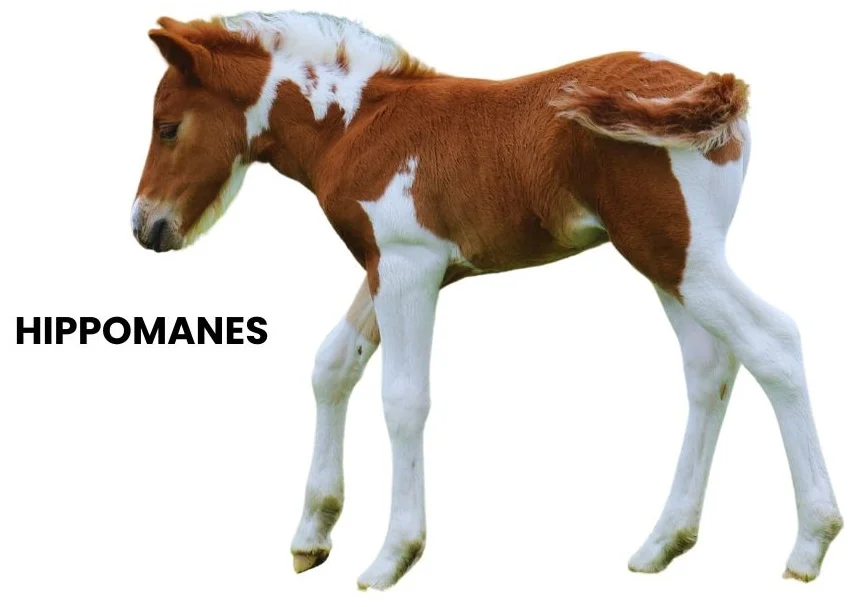Hippomanes, derived from the amniotic fluid of a young colt, has a historical reputation as an aphrodisiac in Greek literature.
In homeopathy, it is used to treat conditions related to icy coldness in the stomach, increased sexual desire, prostatitis, joint weakness, and neurological symptoms like chorea.

SOURCE INFORMATION
Scientific Classification
- Kingdom: Animalia
- Phylum: Chordata
- Class: Mammalia
- Order: Perissodactyla
- Family: Equidae
- Genus: Equus (specifically from the young colt)
Origin
- Hippomanes is a substance traditionally obtained from the amniotic fluid of a young horse (colt).
- It has been historically known for its use as an aphrodisiac in ancient Greek culture, believed to enhance sexual potency.
Historical Facts
- The use of Hippomanes as an aphrodisiac date back to ancient Greek literature, where it was documented by authors like Pliny the Elder and Dioscorides.
- It was considered a rare and potent substance, often surrounded by mystical and legendary attributes.
- In modern times, its use in medicine has evolved to include homeopathic preparations, focusing on its effects on sexual function and neurological symptoms.
KEY CHARACTERISTICS
STOMACH
- This symptom is particularly notable as it deviates from common descriptions of gastrointestinal issues.
- It indicates a profound imbalance in the autonomic nervous system, potentially affecting digestion and metabolism.
- This icy cold sensation can be distressing and may be accompanied by other symptoms like nausea or discomfort.
MALE
- Increased Sexual Desire: This heightened libido can be due to hormonal imbalances or neurological hyperactivity.
- It can cause significant distress and affect daily life.
- Prostatitis: This inflammation of the prostate can cause urinary problems, pelvic pain, and sexual dysfunction. It is a common issue that can be acute or chronic.
- Drawing Pain in Testicles: This type of pain is often described as a pulling or dragging sensation, suggesting issues like varicocele, infection, or nerve compression.
EXTREMITIES
- Violent Pain in Wrist: This severe pain can indicate acute inflammation, injury, or conditions like carpal tunnel syndrome.
- It severely impacts the ability to use the hands effectively.
- Paralysis of Wrists: The inability to move the wrists can result from severe nerve damage, muscle atrophy, or neurological diseases, leading to significant disability.
- Weakness in Hands and Fingers: This generalized weakness can stem from systemic conditions like nutritional deficiencies, chronic illnesses, or neurological disorders.
- Weakness in Joints of Feet and Knees: Similar to the hands, weakness here can affect mobility and balance, indicating systemic issues or localized joint problems.
- Symptoms of Chorea: These involuntary movements are characteristic of conditions like Huntington’s disease or can be a side effect of certain medications.
- They significantly impair motor function and coordination.
GENERAL
- Rapid growth, especially during adolescence, places high demands on the body’s resources.
- This can lead to transient or prolonged periods of weakness as the body tries to adjust to new physical dimensions and metabolic needs.
- Proper nutrition and rest are crucial during these phases to support healthy development.
MODALITIES
- Symptoms worsen with rapid growth, suggesting susceptibility during periods of physical development.
- Symptoms may improve with warmth or rest.
RELATIONSHIP WITH OTHER DRUGS
- Compare: Causticum, another homeopathic remedy known for its effects on the urinary tract, joints, and neurological symptoms.
DOSE
- Typically prescribed in potencies ranging from sixth to thirtieth.
Frequently Asked Questions
What is Hippomanes?
- Hippomanes is a substance derived from the amniotic fluid of young colts and historically regarded as an aphrodisiac in ancient Greek culture.
- In homeopathy, it is used to treat conditions like coldness in the stomach, increased sexual desire, prostatitis, joint weaknesses, and neurological symptoms such as chorea.
What are the key characteristics of Hippomanes in homeopathy?
- It is characterized by icy coldness in the stomach, heightened sexual desire, specific male reproductive symptoms, joint pains, and neurological manifestations like chorea or involuntary movements.
Glossary of Difficult Words
- Aphrodisiac: A substance believed to enhance sexual desire or performance.
- Prostatitis: Inflammation of the prostate gland.
- Chorea: A neurological disorder characterized by involuntary, rapid, jerky movements.
- Potency: Refers to the strength of a homeopathic remedy preparation.
